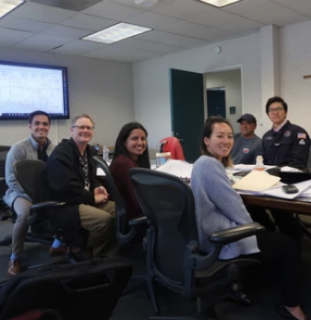Industry Insights and Featured Topics
Here, we provide valuable insights and updates on process safety across industries. Our team of experts curates the latest information, best practices, and emerging trends to empower your organization's safety and compliance efforts. Explore articles, case studies, and webinars, and join the conversation on featured topics shaping the future of process safety. Thank you for choosing us as your resource for staying informed and enhancing safety.

Safety Studies: What You Should Know About Saltegra’s Flagship Service
Introduction
Saltegra Consulting LLC distinguishes itself with a core value that goes beyond expertise—it is a guiding principle that we call Mastery. Our unwavering commitment to knowledge and continuous learning enables us to deliver industry-leading proficiency in Process Hazard Analysis (PHA), Hazard and Operability (HAZOP), and Layer of Protection Analysis (LOPA).
As consultants, we recognize that the value of our services and products is directly tied to our knowledge and experience. Mastery sets us apart, and in this article, we explore the profound significance of PHA and how its diverse methodologies are used in chemical processing companies in the USA. We also showcase how Saltegra Consulting LLC, guided by the core value of Mastery, emerges as your trusted partner in elevating safety, efficiency, and ongoing excellence.
Understanding Process Hazard Analysis (PHA)
PHA is a meticulous and systematic review of chemical and manufacturing plant operating procedures. The primary objective is to identify potential causes and assess the consequences of hazardous chemical releases. This proactive process aids organizations in recognizing a spectrum of risks, spanning from equipment failures to human factors, thereby enhancing safety measures, averting downtime, and safeguarding the environment.
It is a systematic effort aimed at identifying and analyzing hazards associated with the processing or handling of highly hazardous materials. It serves as a method to furnish information, empowering workers and employers to make decisions that enhance safety.
The importance of PHA lies in its ability to provide a comprehensive understanding of the processes, highlighting potential issues, mitigating risks, and proposing avenues for performance and quality enhancement. By reducing the risk of incidents leading to fatalities, injuries, and property damage, PHA plays a pivotal role in preemptively addressing challenges in the operational stage before they escalate into catastrophic proportions.
PHA, a cornerstone of our services, takes on various forms—ranging from qualitative to semi-quantitative to fully quantitative. Our PHA studies not only comply with OSHA PSM 29 CFR 1910.119 requirements and CCPS best practices but also embody the Mastery we bring to every project.
Adaptable to the evolving needs of our clients, we utilize the most popular and widely accepted PHA-Pro© software, which showcases our commitment to staying at the forefront of technology and methodologies.
Selecting the Right Methodology

Mastery in PHA extends to selecting the most suitable methodology for the unique needs of clients in the USA and other countries. Saltegra Consulting’s extensive experience encompasses methodologies such as HAZOP, LOPA, Event Tree, Fault Tree, Bowtie, What-If and Structured What-If (SWIF), Failure Mode and Effects Analysis (FMEA), and Quantitative Risk Assessment (QRA). Our Mastery ensures a tailored approach, aligning with industry standards and regulations and optimizing the effectiveness of each PHA method.
| Methodology | Type | Applicability | Focus | Complexity | Output |
| HAZOP | Qualitative | Diverse Industries | Identifying deviations and hazards | Moderate | Deviation lists, risk rankings, and recommendations |
| LOPA | Semi-Quantitative | High-Risk Scenarios | Evaluating safeguards and risk | Moderate | SIL targets, risk assessment, and recommendations |
| Event Tree | Qualitative/ Quantitative | High-Risk Scenarios | Sequencing events and outcomes | Moderate to High | Visual representation of event sequences and outcomes |
| Fault Tree | Qualitative/ Quantitative | High-Risk Scenarios | Identifying root causes of events | Moderate to High | Visual representation of fault causes and event paths |
| Bowtie | Qualitative | High-Risk Scenarios | Visualizing causes and consequences | Moderate to High | Diagram depicting event causes, consequences, and controls |
| What-If & Structured What-If | Qualitative | Various Industries | Identifying potential issues | Low to Moderate | Scenario exploration, risk identification, and mitigation |
| FMEA | Qualitative | Various Industries | Analyzing failure modes and effects | Low to Moderate | Prioritized list of failure modes, effects, and mitigation |
| QRA | Quantitative | High-Risk Scenarios | Assessing numerical risk likelihoods | High | Quantitative risk values, scenarios, and probabilities |
Note: The criteria mentioned in the table are indicative and can vary based on the specific requirements and context of the organization or project.
Is HAZOP the Right Method?
HAZOP may have a near-universal adoption in the U.S., but there are situations where alternative approaches provide superior results. OSHA PSM points out several PHA methodologies, each with its own set of advantages and disadvantages. What-If approaches prove useful for high-level conceptual evaluations, while FMEA excels in component-level analysis. Alternatively, fault trees offer insights into complex combinations of failures and conditions.
HAZOP may not always be the best fit due to difficulties in developing a comprehensive list of process parameters and deviations. Beyond OSHA PSM recommendations, fruitful approaches like the Bowtie method, originating from the offshore industry, have been effectively utilized for graphical analysis in specific scenarios.
Saltegra proudly collaborates with CGE Risk Management, a leading provider of BowtieXP barrier-based software solutions. This partnership enhances our commitment to delivering unparalleled expertise in integrated risk and incident management. BowtieXP empowers our clients by visually representing complex scenarios through bowtie diagrams.
These diagrams vividly capture the relationship between potential hazards, preventive barriers, and consequences, fostering a comprehensive understanding of risk landscapes. Together with CGE, Saltegra ensures that organizations can navigate the intricacies of risk management with precision, fortifying their resilience and fostering a culture of safety and excellence.
While considering alternatives to HAZOP is crucial, our Mastery allows us to use HAZOP in situations that may not initially seem suitable or within the typical HAZOP team’s skill set, such as in novel technologies.
Addressing Various PHA Needs
Saltegra offers a comprehensive suite of PHA services tailored to meet the diverse needs of our clients. For those initiating new projects or lacking existing PHAs, our “Ground Up” service provides a meticulous PHA starting from scratch, ensuring a thorough examination of potential hazards. This service is particularly beneficial for clients embarking on new ventures or projects without an established PHA framework.
Our “Revalidation” service is designed to renew existing PHAs at specific intervals, ensuring the risk review for the entire unit or process remains valid. This stage is a crucial component of the PHA lifecycle, emphasizing our commitment to up-to-date and accurate risk assessments.
Saltegra also specializes in “Management of Change (MOCs),” addressing one of the regulatory requirements of Process Safety Management. Our MOC service ensures that changes to facilities, personnel, policies, or operations related to chemical processes are meticulously analyzed, documented, and communicated. This management system covers modifications to process chemicals, technology, equipment, procedures, and facilities, excluding “replacement in kind,” aligning with design specifications to guarantee process safety and compliance.
| PHA Service | Objective | Focus | Typical Study Length | Phase in Plant Project | Results |
| Ground Up PHA | Thorough examination of potential hazards for clients initiating new projects or lacking existing PHAs | Comprehensive analysis starting from scratch to establish a foundational PHA framework for new ventures | Lengthy due to the comprehensive nature of starting from scratch | Typically conducted in the early phases of project planning or before project initiation | Establishes a robust understanding of potential hazards, providing a solid foundation for safety measures throughout the project lifecycle |
| Revalidation PHA | Renewing existing PHAs at specific intervals to ensure ongoing validity of the risk review for the entire unit or process | Focused on validating and updating existing PHAs to reflect changes and advancements over time | Moderate, depending on the complexity, and changes over time | Integral to the ongoing lifecycle of a plant, conducted at specified intervals during operation | Ensures continued accuracy of risk assessments, addresses evolving risks, and maintains compliance with safety standards and regulations |
| Management of Change (MOC) PHA | Addressing regulatory requirements of Process Safety Management (PSM) by meticulously analyzing, documenting, and communicating changes to facilities, personnel, policies, or operations related to chemical processes | Concentrated on managing changes within the chemical process environment, ensuring compliance with PSM regulations | Varies based on the scale and nature of the changes | Typically implemented during operational phases when changes to facilities, processes, or personnel are proposed or underway | Provides a systematic approach to handling changes, ensuring thorough analysis, documentation, and communication to maintain process safety and compliance |
Layer of Protection Analysis (LOPA) as a Service Specialty
Beyond PHA, our consultants excel in LOPA, demonstrating Mastery in its standalone application, supporting other PHA methods, or determining Safety Integrity Level (SIL) targets. To us, Mastery means not only identifying risks but also providing valuable insights and solutions to address high-risk scenarios. Leveraging our Mastery of LOPA, Saltegra Consulting guides your team through intricate risk assessments, ensuring robust mitigation strategies are developed.
Cost Savings and Risk Management: A Masterstroke in Efficiency
PHA, executed with Mastery, becomes a strategic tool for cost savings and risk management. Saltegra Consulting’s consultants employ risk-ranking techniques, demonstrating Mastery to help your organization identify potential risks, mitigate them, and strategically prioritize safeguards. Mastery means optimizing safety measures and resource allocation effectively, ultimately enhancing efficiency and reducing operational risks.
Adaptive Approach to PHA Sessions
The COVID-19 pandemic has swiftly transformed remote HAZOP from an infrequent practice to a commonplace approach. The question arises whether this shift may persist in the future, driven by health considerations or the desire to mitigate the costs and time associated with travel. Despite initial concerns, remote HAZOPs have proven more successful than anticipated, and specific preparations have played a pivotal role in their effectiveness.
Additionally, the introduction of a separate scribe proved beneficial, particularly in new design HAZOPs, saving time for the facilitator, who could focus on other responsibilities while the scribe managed worksheets and drawings. The online setting experienced fewer interruptions compared to traditional studies, where factors like people entering the study room, casual greetings, or unplanned conversations disrupted proceedings.
Expertise Across Diverse Industries

Saltegra Consulting is a beacon of expertise spanning a multitude of process industries, showcasing a diverse portfolio that includes:
Aerospace
PHA in aerospace focuses on intricate manufacturing processes, propellant handling, and assembly operations. The analysis encompasses potential hazards related to fueling procedures, propulsion systems, and the handling of hazardous materials. It ensures the highest safety standards in the design and production of aircraft and spacecraft.
Biogas/Biomass
In the realm of biogas and biomass, PHA plays a pivotal role in assessing risks associated with the production of renewable energy. The analysis involves scrutinizing processes related to biomass conversion, gasification, and biogas generation. Identifying potential hazards ensures the safety of personnel, the environment, and the seamless functioning of energy production.
Chemical Manufacturing
PHA’s roots lie deep in chemical manufacturing, where its application is fundamental. It addresses risks associated with processing and handling various chemicals, preventing incidents that could lead to catastrophic consequences such as spills, releases, or chemical reactions gone awry.
Food & Beverages
Within the food and beverage industry, PHA examines processes from raw material handling to packaging. The focus is on potential hazards related to equipment failures, contamination risks, and the handling of ingredients. By identifying and mitigating these risks, PHA ensures the production of safe and high-quality food products.
Healthcare
PHA in healthcare extends beyond traditional manufacturing contexts. It is crucial in assessing risks related to the handling and administration of pharmaceuticals, medical gas systems, and laboratory processes. Ensuring safety in healthcare processes is paramount to preventing adverse events and upholding patient well-being.
Industrial Manufacturing
In the broader landscape of industrial manufacturing, PHA is employed to evaluate risks associated with diverse production processes. It addresses potential hazards in manufacturing lines, equipment operations, and material handling, ensuring a comprehensive understanding of risks and the implementation of effective safety measures.
Novel Technologies
With the rapid advancement of novel technologies, PHA becomes indispensable in assessing risks associated with cutting-edge processes. Whether it’s the development of new materials, nanotechnologies, or innovative manufacturing techniques, PHA provides a systematic approach to identifying and mitigating potential hazards.
Oil & Gas
In the oil and gas industry, PHA is vital for ensuring safety in exploration, extraction, refining, and transportation processes. It addresses risks related to drilling operations, chemical handling, and the operation of complex machinery, contributing to the prevention of accidents and environmental incidents.
Pharmaceuticals
PHA in the pharmaceutical sector focuses on evaluating risks associated with drug manufacturing, formulation processes, and laboratory activities. Identifying potential hazards in these processes is essential to maintain the quality, efficacy, and safety of pharmaceutical products.
Refrigeration
In refrigeration systems, PHA is employed to assess risks related to the handling of refrigerants, system malfunctions, and equipment failures. By identifying potential hazards, PHA contributes to the safe and efficient operation of refrigeration systems, preventing leaks or incidents that could lead to environmental harm.
Renewable Energy
PHA in the renewable energy sector addresses risks associated with various processes, such as solar panel manufacturing, wind turbine operations, and biofuel production. It ensures the safe and sustainable generation of energy from renewable sources.
Solids Handling
The handling of solids, whether in manufacturing or material processing, presents unique challenges. PHA evaluates potential hazards related to equipment design, material flow, and storage, ensuring the safe handling of solids to prevent incidents such as dust explosions or material spills.
Conclusion
Within these intricate landscapes, our consultants, recognized as true masters in their craft, rise to the challenge by navigating the unique challenges each industry presents. Their proficiency allows for the delivery of tailored solutions meticulously designed to emphasize safety and compliance.
At Saltegra Consulting LLC, our commitment to the core value of Mastery defines us as your steadfast partner in unraveling the complexities inherent in PHA, HAZOP, and LOPA. Guided by a masterful approach and employing the right PHA methodologies, we empower organizations in the USA and abroad to identify and effectively mitigate risks. Our focus extends beyond risk reduction, striving to optimize safety measures and foster operational excellence within your processes.




